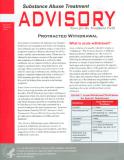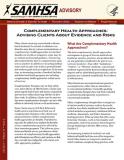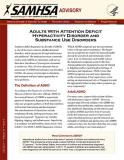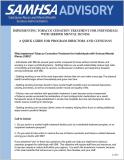
This advisory defines protracted withdrawal and identifies specific withdrawal symptoms associated with alcohol, opioids, methamphetamine, cocaine, marijuana, and benzodiazepines. The advisory also explains how protracted withdrawal differs from acute withdrawal, and gives tips to help clients manage it in recovery.
Units per Product
Download
Protracted Withdrawal, Substance Abuse Treatment Advisory, July 2010, Vol. 9, Issue 1
File Type: PDF
File Size: 611 KB







